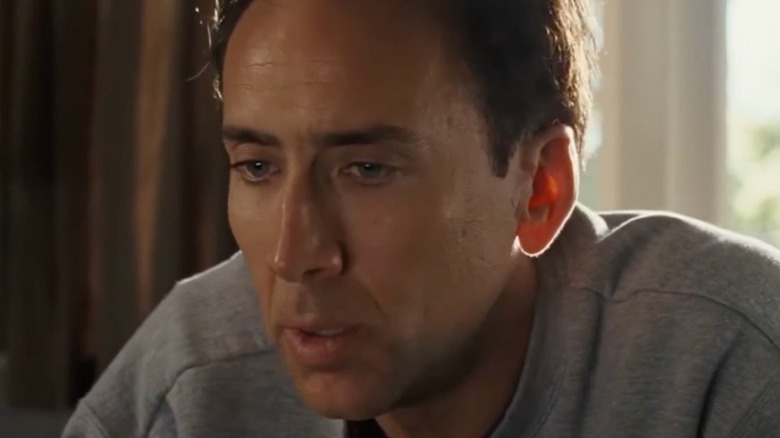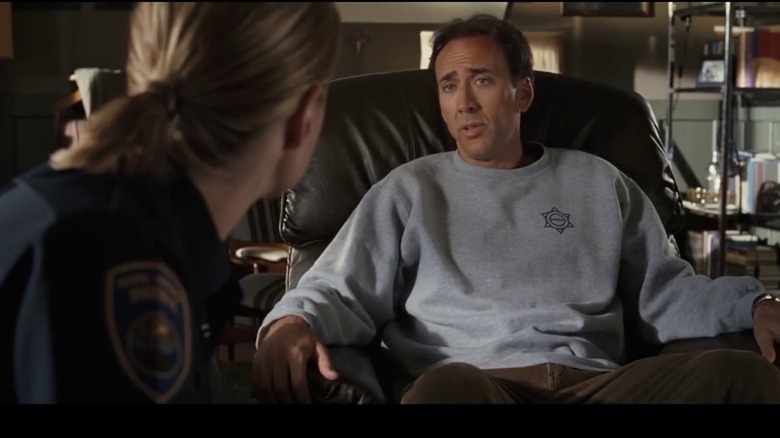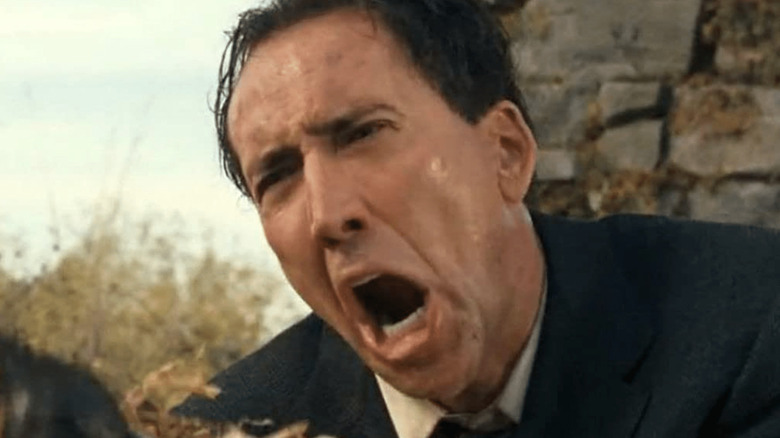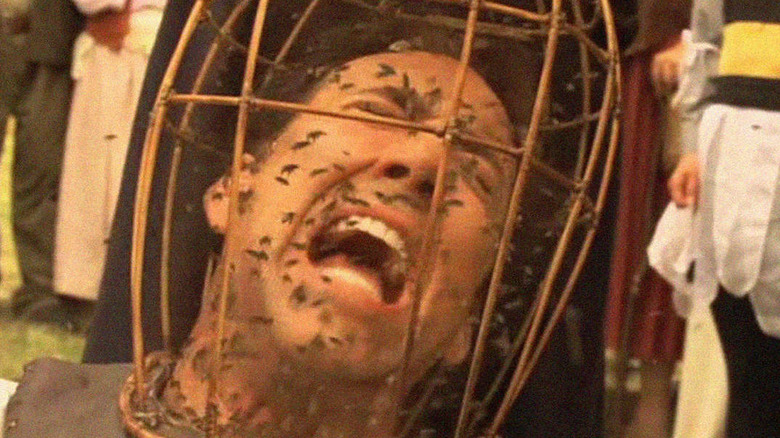The Nicolas Cage Horror Movie That Inspired A Ton Of Memes
In 1973, director Robin Hardy and scriptwriter Anthony Shaffer adapted the David Pinner novel "Ritual" into one of the best, weirdest, and most important movies in the history of horror — "The Wicker Man." The film is part musical, part cult horror, and every last inch of it is a scathing rebuke of the use of religious dominance as a means to enact moralizing oppression as law.
"The Wicker Man" is the tale of Police Sergeant Howie (Edward Woodward) and his willingness to judge an entire island of pagans, turning their lives upside down in search of a supposed missing girl. In the process, Howie finds himself the unwitting sacrifice to the pagan gods that Lord Summerisle (Christopher Lee) and his people worship. Can you justify murder in the name of the public good? That's a question you could ask the people of Summerisle, or, indeed, the very Christian United Kingdom which Howie hails from. And that's precisely the point the original "The Wicker Man" is getting at.
In 2006, writer/director Neil LaBute crafted a remake of "The Wicker Man." The jury is out as to what exactly the remake film is about subtextually, but the lesson of the remake is pretty clear — if you cast Nicolas Cage and allow him to yell at women and wear a bear suit onscreen for an hour and 42 minutes, you will strike immortal meme-level comedy gold.
And, indeed, while 2006's "The Wicker Man" may not be fondly remembered in the classic "oh, wow, what a great movie" sense, it is remembered through memes plural. It's worth looking at the remake's legacy from that vantage point. Not only is the remake "The Wicker Man" influential, but it is also arguably one of the most influential films of Cage's career.
The Wicker Man is a how-not-to guide in acting like a human
One of the most remarkable things about 2006's "The Wicker Man" is that, despite how often mocked it is, its skeletal structure is largely unchanged from the original film: a police officer on the hunt for a missing child becomes the unwitting participant in a pagan rite that sees him burned to death as tribute inside of an enormous Wicker Man.
The only real differences are that the Summerisle of the remake is all about exporting honey and is almost entirely populated by women who see men as inherently inferior. And as for Nic Cage's character Edward Malus, he is only different from Sergeant Howie on a textual level in that Malus believes the missing child to be a daughter he didn't know he had.
What makes 2006's "The Wicker Man" so meme-able isn't the script so much as it is the visuals and Cage's stunningly bizarre performance throughout. If you've ever wanted to see a man react to a busy signal on a phone like he's just been shot directly in the ear, you need only watch Cage in "The Wicker Man." If you want to watch a man in a bear suit peel back and punch a woman in the face like his life depends on it, you need only watch Cage in "The Wicker Man."
Everything about Cage's physicality is indescribable except to say that, after decades of being an award-worthy actor, he suddenly has no idea what to do with his arms, hands, feet, or seemingly any part of his body when the camera is on him. Every one of those moments we've touched on so far is absolutely meme-worthy, but there are two specific sequences that take "The Wicker Man" from goofball oddity to the stuff of legend — the scene with the burned doll and the deleted bee scene.
How'd it get burned?
A missing child is no laughing matter. Under any sane circumstance, when watching a person frantically trying to find a child who is not only missing, but likely in imminent danger, most human beings would feel deep empathy and concern. So when Edward Malus discovers a burned-up doll supposedly belonging to his maybe-daughter Rowan (Erika Shaye) in a graveyard, it makes sense that he would be distressed. But the way Cage responds to Rowan's mother Willow (Kate Beahan) is to scream the phrase "How'd it get burned" about the doll over and over again at the top of his lungs, as seen in this YouTube clip.
The scene should be tense and we should feel that empathy all the cool kids are so into nowadays, but instead, Cage's screaming sounds less like a child might be burned to death and more like a child needs to be scolded for stealing Dad's signed Babe Ruth baseball. His panic is almost right, except after four times of saying "How'd it get burned," it becomes unnatural. It's like the scene from "Black Sheep" where David Spade and Chris Farley get so high that they can't stop repeating the word "roads" and laughing because it sounds weird. In short: Cage's repeated reciting of that one line is so strange it makes people feel like they are on drugs — so naturally, the scene became a meme.
Not the bees!
The biggest meme of all comes from what may be the most infamous deleted scene of all time. After Malus is caught by the cult, his legs are broken, and a caged helmet is affixed to his head, through which bees are poured in to sting his face. In the abstract, this sounds absolutely horrifying. Even if you're not allergic to bees, the very thought of being repeatedly stung would make anyone wince in sympathetic pain.
And yet, somewhere between the uncanny valley of what are clearly CGI bees and Cage repeatedly yelling "not the bees" in the most unbelievable display of terror perhaps ever seen on film, you might become convinced that the actor himself is CGI. His performance is so odd, you could make an argument that the real Nic Cage is dead (much like Paul McCartney supposedly was) and that a robot doppelganger was taught how to act for this movie by being sat in front of a TV to watch "Troll 2" and "The Room" on a loop. "Paul is dead" is arguably one of the biggest memes of all time, and, so, too, is Cage screaming "not the bees" like he's been working 14-hour days for the last week and just found out he's being paid scale.
Where would we be without these memes? How we would express the unintentional hilarity of impotent rage without "How'd it get burned" and "Not the bees," is anyone's guess. But the larger question is this: where would Nicolas Cage be without "The Wicker Man"? Since the film's release, Cage has utterly embraced the unnerving (and sometimes unintentionally hilarious) side of horror with movies like "Knowing," "Mom and Dad," and "Mandy." Without "The Wicker Man," would Cage fight through evil mascots in "Willy's Wonderland" or seek revenge after his best friend (a truffle pig) gets stolen in "Pig"? Truly, the scariest thing any of us could ponder is a world without this iteration of Nic Cage.



